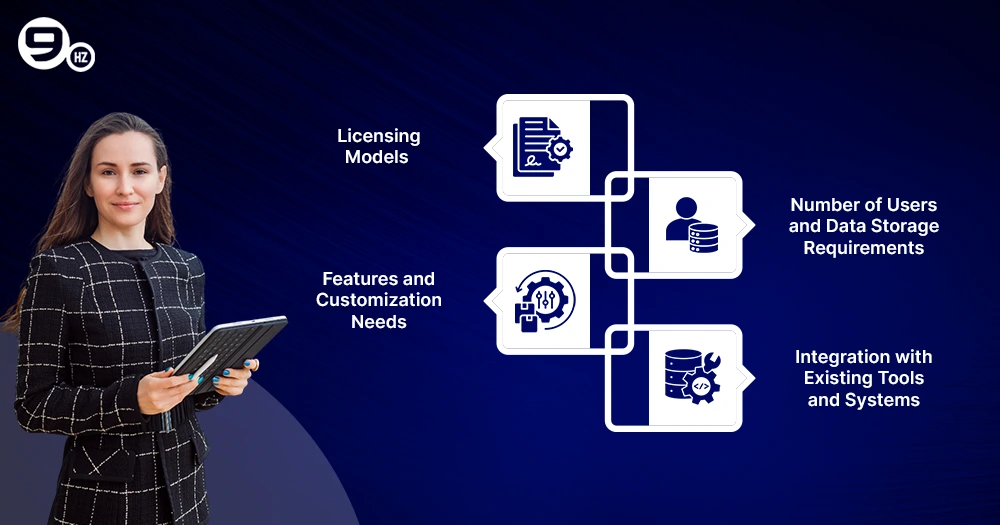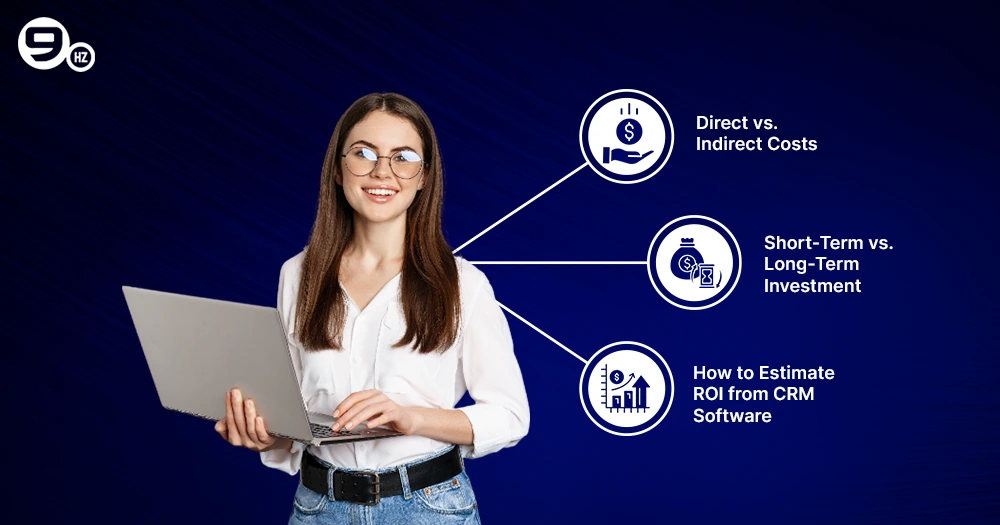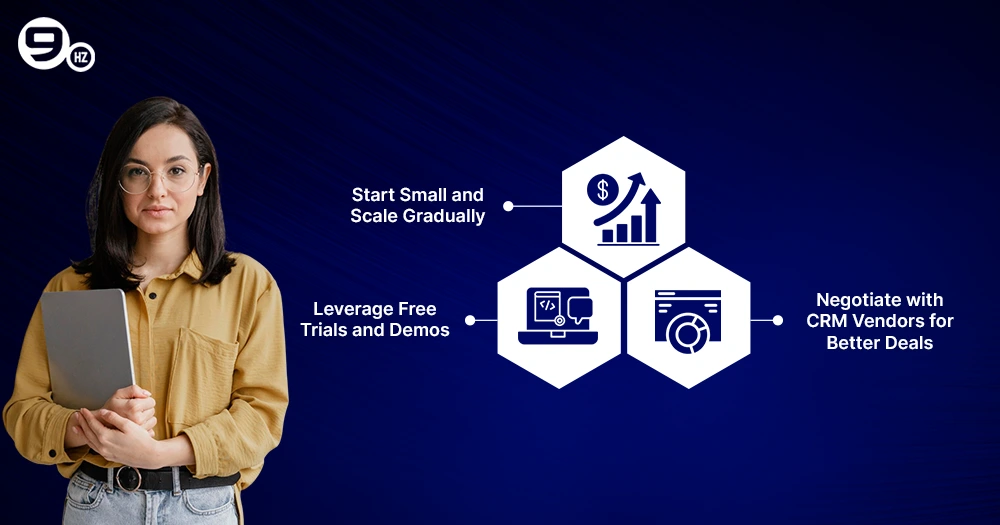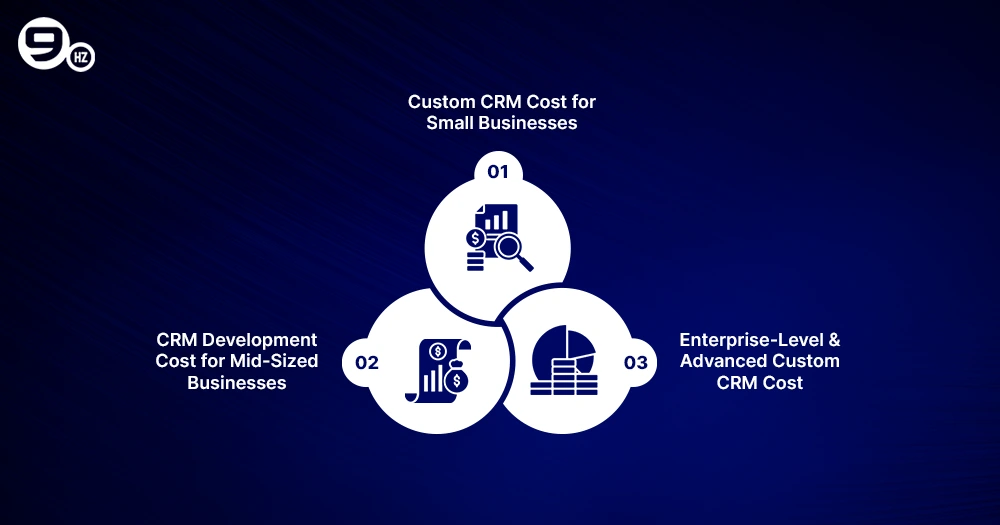Every industry is shifting towards a customer-focused approach to deliver the best experience. It significantly increases the demand for CRM software and tools to access updated customer data, targeting multiple audience groups. Investing in CRM software is a revenue boost decision, and contributes to sales, marketing, and customer service team support. As per Statista, the CRM software will show a growth rate of 8% between the period of 2025 to 2030 to reach the market value of $145.37 billion by 2030.
So, if you are looking to integrate CRM software, it’s beneficial for the sales team, analytics and dashboards, customer-driven automation, collaboration tools, and cloud systems. But before going ahead, it is crucial to consider the CRM software development cost and the different factors affecting the overall costs.
If you are looking for a reliable CRM software development service, The NineHertz is a leading company you can trust. With expertise in delivering customized solutions, we cater to all types of software development needs, ensuring innovation, scalability, and business growth.
Here is the guide blog to walk you through the cost to build CRM software.
Understanding CRM Software Cost
CRM (Customer Relationship Management) software cost refers to the total expenses spent by a business to implement tools and software. Fundamentally, users assume that it only includes the price of the software, but it has other additional costs of customisation, setup costs, training, and ongoing support. Some of the common factors affecting the CRM software cost include customisation requirements, integration needs, number of users, and customer support.
Most companies prefer to integrate third-party CRM software that can be hired through monthly and yearly charges. Take an example of Salesforce CRM, available at $90 and more per user, while Zoho CRM can be available after the pay estimate at $9 per month. Further, based on advanced requirements for AI-driven features and reporting require additional costs. From a long-run perspective, CRM software development cost will extend to avail the benefit of cloud data storage, features, customer support, and adding users limit.
CRM software development cost involves another series of expenses based on which type of CRM your business uses, development approach, existing framework, feature integration, team size, location, and other costs.
For the basic version, it costs around $15,000 to $30,000, mid-sized software costs $40,000-$1,00,000, and enterprise CRM customised software costs beyond $1,00,000+ with the right development approach.
Difference between Upfront and Long-term Costs
Whether you are opting for CRM software development or hiring third-party software, your business should differentiate between upfront and long-term costs. Overall, CRM software cost will depend on the solution you opt for, which includes cloud-based, on-premise, and hybrid CRM solutions.
Upfront cost refers to the cost that is invested initially, once you are starting with investing in CRM software. These costs are usually provided for a one-time cost only to set up the system for business. It includes different cost elements, including software setup and its integration, data migration into the new system, and customisation to adjust for features or dashboards, and training for CRM manuals.
Long-term CRM software development cost is the ongoing expenses that are incurred after your business starts using the tools or software over the period. It comprises subscription fees paid monthly or yearly, updates and maintenance charges, a premium for technical support, and scaling costs for more users, data storage, or advanced features.
Key Factors That Influence CRM Software Pricing
Businesses within the industry domain, like healthcare, manufacturing, real estate, e-commerce, or automotive, have specific demands for CRM software’s features. So, the first step to researching the best CRM software is to consider multiple factors that influence the cost to build CRM software, such as:
Licensing Models ( One-Time Purchase Vs Subscription)
CRM software cost depends on the payment models; the subscription model follows monthly or annual charges for cloud hosting, updates, and customer support. It is ideal for small businesses and startups that do not want to pay all costs upfront and can follow easy upgrades with flexibility.
On the other hand, a one-time purchase for CRM software includes a single investment upfront for on-site premise solutions. It is a cost-effective solution for the long run, and requires additional costs for updates, maintenance, and IT infrastructure.
Number of Users and Data Storage Requirements
CRM software comes with a basic limit of users, and as your number of users increases, for access and data storage, the overall cost increases. The difference lies in the model preference as well, cloud-based CRM charging per user, offering customised storage plans that cost less.
On the other hand, on-premise solutions are packed with backups and expensive servers that increase overall CRM costs. It is ideal for an eCommerce business that stores more than 1000 customer profiles and transaction history requires higher storage expenses.
Features and Customisation Needs
Next, another factor affecting CRM cost is feature integration, where the basic one with minimal features, like customer management, tracking leads, and reporting features, needs less cost and is ideal for small businesses. As the business chooses more complex and specialised integration, it needs customisation and additional development, which will increase the costs.
Customisation for CRM software includes interface, feature customisation, third-party integrations, analytics and dashboard, marketing tools, payment gateway, and customer support.
Integration with Existing Tools and Systems
Some businesses prefer to integrate other tools as well with CRM software, such as email marketing, ERP systems, eCommerce plugins like WooCommerce and Shopify, and accounting software as Xero.
However, these advanced integration requires more setup time and technical expertise, which affects the tools and software pricing and is more expensive. On the other side, plug-and-play integration with Shopify is more accessible and affordable.
Hidden Costs You Shouldn’t Ignore for CRM Software Costs
Besides the cost to invest in buying CRM software or development costs, there are additional hidden costs involved that increase the investment. Here is the list of hidden costs that directly impact the assessment for CRM software costs:
Implementation and Onboarding Expenses
It involves all the initial setup expenses that are required to successfully install CRM software for your business:
- Data Migration: Cost incurred on transferring data related to existing customers, operational, and sales from the old to the new system for CRM.
- Customisation: It includes the expense of modification of CRM software with features, workflows, and interface fits for business needs.
- System Setup: Initial cost involves configuring CRM software based on your business requirements.
- Consulting Fees: Payment to share the external support to execute for smooth CRM deployment.
- Breakdown Gap: While switching from the old to the new system, it creates a gap with temporary business disruption that increases additional expenses.
Training and Change Management Costs
It includes all the training and guidance costs to make employees learn about the process and how to use CRM software:
- Learning resources: It includes all costs to acquire resources for continuous learning through manuals, e-learning tools, and explainer videos.
- Internal trainers: Costs that involve appointing in-house experts to train employees.
- Productivity Dip: Temporary resource waste due to the decline as employees adapt to new processes.
- Employee Training: Cost involved in introducing workshops and sessions to make employees understand the CRM software.
Maintenance, Upgrades, and Technical Support Fees
It includes all the expenses after installing CRM software to keep it updated regularly and support:
- Upgrades: Cost related to new features, enhancements, and software updates to increase security
- Maintenance: Expenses incurred in fixing bugs, optimising performance, and improving operations
- Compliance: Regular adjustments based on compliance standards and regulations
- Scalability Cost: Additional cost for scaling CRM software capabilities and growth
Calculating the Total Cost of Ownership (TCO)
For CRM software, the total cost of ownership is the sum of all the costs relating to the lifecycle of the software. It includes the entire expenses beyond the initial prices, like operational costs, direct and indirect costs. Businesses require calculating TCO for budgeting, long-term future projections, informing vendors, ROI calculation, risk management, and technology investments.
Direct vs. Indirect Costs
Direct cost for CRM software refers to the visible expenses incurred to buy and develop the software. It includes customisation, licensing fees, implementation, and ongoing maintenance that are easier to track for the right budget.
Indirect Costs are more hidden and less visible, which is more important to run CRM software. It comprises expenses for productivity dips, training for employees, integration with other systems, and downtime.
Short-Term vs. Long-Term Investment
Before investing in CRM software, it is essential to get an estimate for costs that fall beyond the initial subscription and purchase. Short-term investment for CRM includes the expenses relating to onboarding, setup costs, and early age support.
Long-term costs comprise the expenses between switching over vendors, compliance management, security controls, scaling, and software upgrades. It is investing for a long-term perspective to deliver sustainable value as the operation grows.
How to Estimate ROI from CRM Software
Return on Investment for CRM software refers to the net value that a business gains from CRM software compared to the total cost. Considering these metrics helps in evaluating benefits like increased sales, operational efficiency, customer retention, and long-term profitability for software.
Here is the step-by-step process of calculating ROI for CRM software:
- Calculating total CRM costs that include licensing fees, training, implementation, and maintenance. Let’s assume the annual total cost of CRM software is $20,000.
- Measuring the tangible benefits in quantitative aspects like increased sales leads, reduced churn rate, and low operational costs. For example, sales revenue increased by $50,000/year with 20% more conversions.
- There might be intangible benefits, such as faster services or improved customer satisfaction. Like, faster response time can improve customer retention by 10% or more.
- Calculating Return on Investment as: (Net Gain from CRM software/Total Cost*100), we can estimate as
(50,000-20,000)/50,000*100 = 150% ROI
To explore more on CRM software, you may also like reading our detailed blogs on
How to Build Your Own CRM? [2025 Guide]
Top 20 CRM Software Development Companies in 2025
Tips to Optimize Your CRM Budget
Optimising the CRM software cost, providing the best value for your investment that helps you to overcome constraints with budget, and setting up a system to increase your sales and customer management process. Here are the proven tips to optimise your CRM budget:
Start Small and Scale Gradually
Instead of investing in an advanced version of CRM software initially, you can start with basic software with limited features. Like, small startups can begin with a basic CRM plan to handle their core operations, to track leads, and use email automation. Once they start leveraging, it can be upgraded with advanced features, multi-channel integration, analytics, a dashboard, and AI tracking that effectively manage the budget.
Leverage Free Trials and Demos
Opting for free trials and demos is a useful way to optimise your CRM budget without any financial risks. Different CRM providers like Zoho and HubSpot are providing their 15 to 30-day trial versions to test for usability for your business system. It eliminates the risk of incompatibility, CRM integration, and re-investment. This method offers to invest only in software that aligns with business goals and prevents wasteful spending.
Negotiate with CRM Vendors for Better Deals
Your business will find multiple options for CRM software Zoho, Salesforce, or Pipelines. It is crucial to negotiate for better pricing and offers. While facing competition, vendors do provide for flexibility in prices, bulk licensing, and annual packages. So, negotiation acts as the measure to generate the maximised value for investment, reducing upfront cost while availing enterprise-based features.
Benefits of Developing Custom CRM Software
Developing custom CRM software adds many benefits to your business as the generic versions are not compatible with align with your business challenges. Unlike traditional CRM software, these custom tools are built with better workflow, industry, and business requirements. Specific industries like fintech and healthcare, custom solutions proven to be more secure and compliance-friendly.
Some of the top benefits of developing your custom CRM software are:
Flexibility and Scalability
Developing a customised CRM software can be modified based on new models, workflows, tech integration, and scale with your operations. Customisation brings a more flexible approach to add-ons with supportive features such as AI insights, advanced reporting, and multi-branch support.
Integrate with Third-Party tools
Businesses are dealing with cross-department functions required to connect their CRM system with other tools for ERP, accounting software, and eCommerce platforms. It helps to ensure that data can be easily transferred across the departments for efficient operations and more accurate inventory estimates. Basic CRM might lack these compatibility features to increase its sales and customer service.
Long-term Investment
In the initial phase, custom CRM software might look like an expensive investment as the scope of operation is limited. But as business grows and customer base increases, it will provide long-term value with more scalability, access control, compliance standards, and drive revenue through data insights and personalised experiences.
Data Security
With custom CRM software, your key customer data is more securely stored and encrypted with access controls. Specifically, industries like banking, healthcare, and fintech require strict compliance standards with secure logins, HIPAA-compliant features, and activity logs for sensitive data.
Advance Insights and Analytics
Custom CRM software has built-in analytics and dashboard tools to track your KPIs. It improves assessment and extracting insights like customer behaviour, sales performance through specialised dashboards. Businesses can easily use these insights for future projections.
Extended Ownership and Control
Custom CRM software provides flexibility to not depend on third-party vendors for access and security control. In case of any backlog and server blocks, backend operators can take immediate action to manage the system. It also adds the benefits of no dependency on forced upgrades and discontinued services.
Faster Decision-Making
Traditional software takes time to generate reports, which delays the maximum operational tasks. With custom CRM software and automated processes, it generates reports and numbers promptly to support managers in making decisions faster and responding to queries. As the customer gets a quick resolution, it increases the overall satisfaction rate.
Reduce Data Errors and Redundancy
Custom software creates a centralised data information system that easily complies with other systems. It reduces data redundancy and errors with consistent data flow through regular validation checks and automated updates. Automation reduces human dependency to verify billing and sales details and makes the process faster.
Analyzing the Cost of Custom CRM Development for Different Business Sizes
The cost of building CRM software can significantly depend on business needs, sizes, and feature complexities. Every business requires CRM software to run its operations; however, the cost varies based on the scale of operations. There are additional factors affecting as well, like technology stack, development approach, and types of CRM software. But, let’s focus on the scale of business and understand how much CRM software costs:
Custom CRM Cost for Small Businesses ($10,000-$50,000)
Here is the classification of CRM software development cost for small-scale businesses, divided into different steps of development:
| Cost Component | % of Total | Estimated Cost (USD) |
|---|---|---|
| Planning & Requirement Analysis | 10–15% | $1,000 – $7,500 |
| UI/UX Design | 10–20% | $1,000 – $10,000 |
| Development & Coding | 30–40% | $3,000 – $20,000 |
| Integrations | 10–15% | $1,000 – $7,500 |
| Testing & QA | 10–15% | $1,000 – $7,500 |
| Deployment & Infrastructure | 5–10% | $500 – $5,000 |
| Maintenance & Support (Annual) | 15–20% | $1,500 – $10,000 |
CRM Development Cost for Mid-Sized Businesses (Approx. $50,000 – $150,000)
Here is the classification of CRM software cost for medium-sized businesses, divided into different steps of software development:
| Cost Component | % of Total | Estimated Cost (USD) |
|---|---|---|
| Planning & Requirement Analysis | 10–15% | $5,000 – $22,500 |
| UI/UX Design | 10–20% | $5,000 – $30,000 |
| Development & Coding | 30–40% | $15,000 – $60,000 |
| Integrations | 10–15% | $5,000 – $22,500 |
| Testing & QA | 10–15% | $5,000 – $22,500 |
| Deployment & Infrastructure | 5–10% | $2,500 – $15,000 |
| Maintenance & Support (Annual) | 15–20% | $7,500 – $30,000 |
Enterprise-Level & Advanced Custom CRM Cost (Approx. $150,000 – $500,000+)
Here is the classification of CRM software development cost for enterprise-level businesses at different stages of software development:
| Cost Component | % of Total | Estimated Cost (USD) |
|---|---|---|
| Planning & Requirement Analysis | 10–15% | $15,000 – $75,000+ |
| UI/UX Design | 10–20% | $15,000 – $100,000+ |
| Development & Coding | 30–40% | $45,000 – $200,000+ |
| Integrations | 10–15% | $15,000 – $75,000+ |
| Testing & QA | 10–15% | $15,000 – $75,000+ |
| Deployment & Infrastructure | 5–10% | $7,500 – $50,000+ |
| Maintenance & Support (Annual) | 15–20% | $22,500 – $100,000+ |
Also Read
20 Best CRM Software in 2025 (Top Ranked)
Conclusion
CRM software is an integral part of your business operations. To avoid the risk of overspending and resource wastage, it is the right approach to calculate the true software cost for your business. Navigating through different CRM pricing models is not an easy thing; multiple factors affect the cost assessment. Whether it’s a one-time payment, a subscription model or development costs, each approach has its pros and cons and aligns with specific business requirements. Most businesses measure the right Return on Investment (ROI) to compare for CRM pricings and find the ideal fit for your requirements.
Popular CRM software providers, including Zoho CRM, Pipedrive, Freshsales, HubSpot, and Salesforce, come with flexible plans for subscriptions. It provides customised feature options to explore to increase usability and scalability, data storage, analytical and reporting, automation features, and mobile optimisation.
Frequently Asked Questions
Let us discuss some of the commonly asked questions regarding CRM Software:
What is the average cost of CRM software for small businesses?
Based on the features and CRM software plans, the average monthly cost can range from $10 to $30.
How much does it cost to develop a custom CRM from scratch?
CRM software cost can range between $10,000 to $1,00,000 based on its complexities and feature integrations.
Is it cheaper to buy ready-made CRM software or build a custom one?
Buying ready-made CRM software is found to be cheaper than custom ones that provide more long-term benefits.
Which is the best company for providing CRM software?
Some of the popular brands providing CRM software are Pipedrive, Salesforce, Zoho, and HubSpot.
Do I need a CRM for my small business?
Yes, any business aiming to nurture its customers, build pipelines, manage leads, and improve sales requires CRM software to run its operations.
Great Together!













